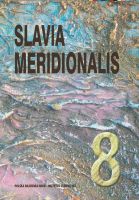Предрасудите и стереотипите поврзани со Балканските Египќани меѓу словенските народи на Балканот
Prejudices and stereotypes related to Balkan Egyptians among the Slavic peoples in the Balkans
Author(s): Rubin ZemonSubject(s): Cultural Essay, Political Essay, Societal Essay
Published by: Instytut Slawistyki Polskiej Akademii Nauk
Summary/Abstract: Even though racial prejudices and stereotypes toward the members of Balkan’s Egyptians community exist and will continue to exists for many years in the society, public, politics and even in the scientific life among Slavic and non-Slavic people on the Balkans, they slowly but surely are taking their own place “under the Son” in the Balkan cultural and ethnic mosaic. The issue of the Balkan Egyptians and the development of their identity, as well as reactions that appear, shows that processes of developing ethnic identities and ethnic particularities in the Balkans have not been finished, yet. On the other hand new horizons, issues and crises are opening. The Balkan Egyptians are one of the “communities without compact territories” in Europe (formulation is used analogically from the Conventions for protection of minorities and regional languages, by the Council of Europe – “languages without compact territory”). Among them are: Vlachs (Aromanians), Jews, Armenians, Roms, Yeni¬shes, Tra¬velers, Beiashi (Rudara) and Samies. Some of these communities are objects of racial discrimi¬nation and stereotypes and some of scholars propose to clarify them with a common name: “communities vulnerable to racial discrimination”. From a scientific point of view the thesis established by professor Martin Bernal in 1987 in his famous book “Black Athena”, where by “crashing” an “Aryan model” and revising “Ancient model”, he gives a necessary base for explaining the issues of colonization, existence of the Balkan Egyptians, as well as reasons for social stigmatization and prejudices related to this community in Europe and the Balkans. Slavic peoples in the Balkan Peninsula accepted Christian religion commonly with a “triangle”: Christianity and Greece against Egypt. With accepting this matrix, racial prejudices toward to the Balkan Egyptians in tradition of Slavic peoples got verifications in religious spiritual life, or better to say, gained support in religion and superstition. With the so-called development of scientific truths, which appeared in Western Europe in the beginning of the 19th century, based on the so-called “Arian model”, racial prejudices toward the Balkan Egyptians got “scientific” dimension. Bearing in mind that the biggest number of eminent intellectuals among Slavic peoples in the Balkans at that time were educated in Western European centers and schools (for example, Vuk Karadzic, Tihomir Gjorgjevic etc.), there was no improvement when it comes to racial prejudices and stereotypes towards the Balkan Egyptians. The community of the Balkan Peninsula with its origins from Egypt was erased from the collective memory.
Journal: Slavia Meridionalis
- Issue Year: 2008
- Issue No: 08
- Page Range: 40-57
- Page Count: 19
- Language: Macedonian

